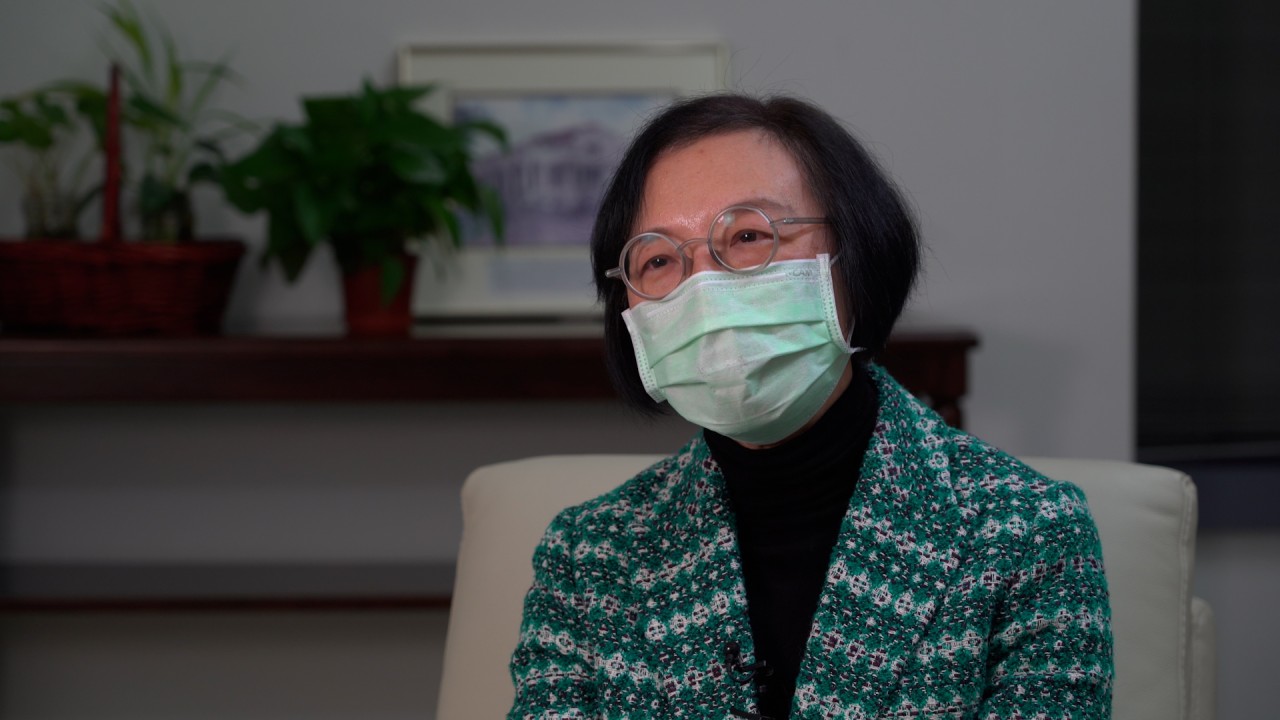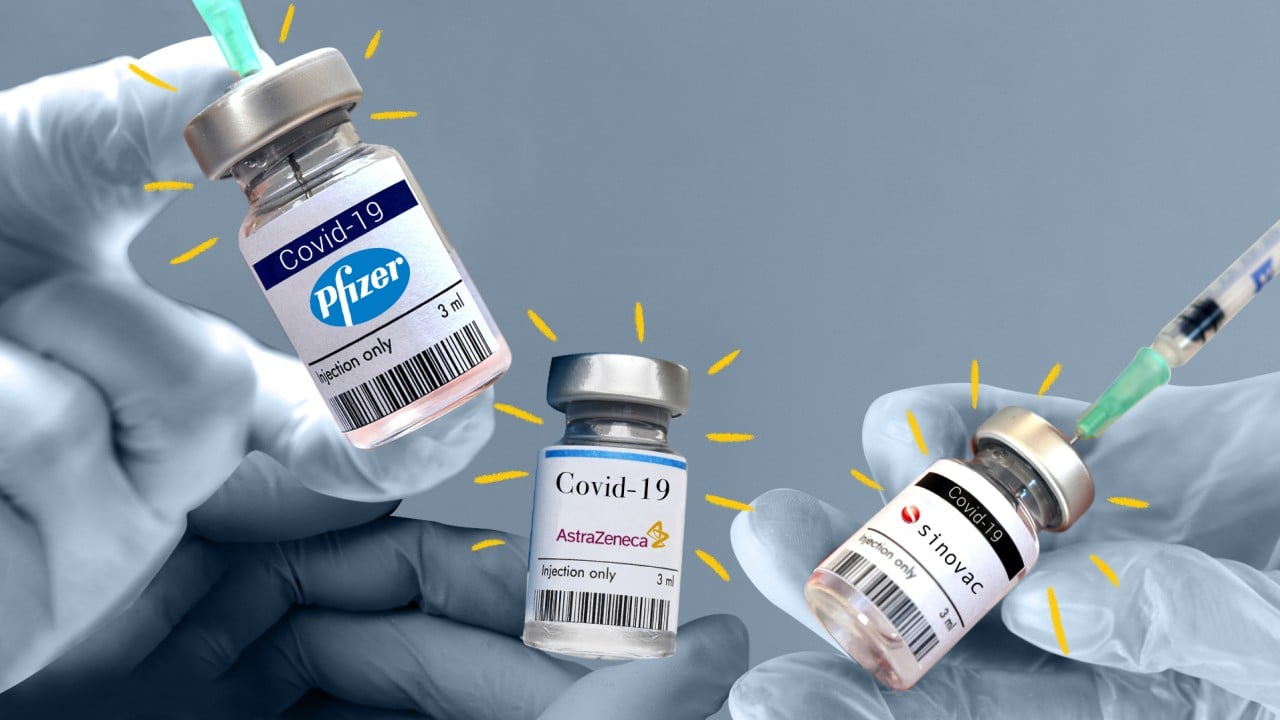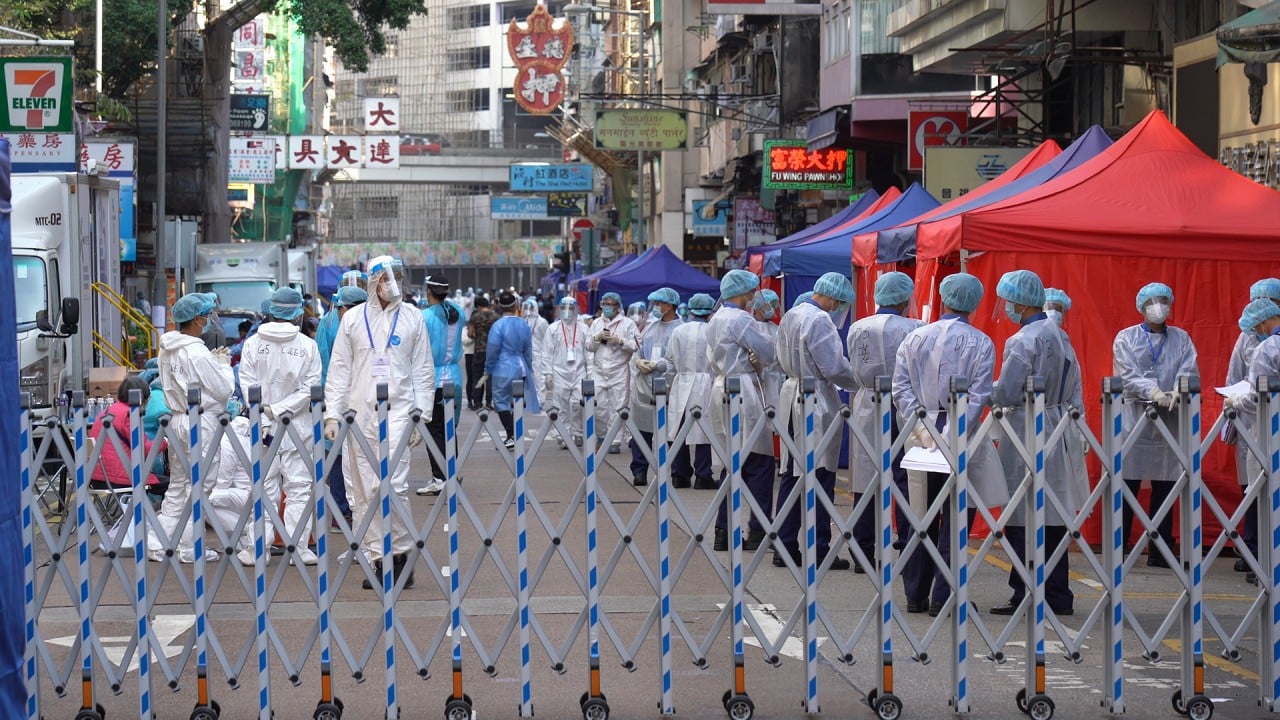
Coronavirus: why Covid-19 vaccination campaign is not a quick cure for Hong Kong’s ills
- Hong Kong is only ‘halfway through the marathon’ as mass vaccination will not happen until the third or fourth quarter, according to public health expert
- Unemployment rate could hit a new high if the coronavirus crisis does not improve, academics warn
Political leaders around the world have gambled on the arrival of Covid-19 vaccines, hoping the battle with the coronavirus will be brought to an end soon. In the final of a two-part series marking the first anniversary of the Covid-19 epidemic in Hong Kong, Elizabeth Cheung and Victor Ting look at what could lie ahead for the city in the coming year. Read part one here
Asked whether this meant Hong Kong would endure a fifth or even sixth wave, Leung replied: “Yes absolutely.”

Leung was scathing in his criticism, accusing the government of being too slow in rolling out jabs, with Hong Kong badly lagging its competitor Singapore.
“Why was Singapore … able to administer its first shot before the new year, not Lunar New Year, but Hong Kong can’t even start right after Lunar New Year?” Leung said.
‘We haven’t even got vaccines in our hands’
Even a bad policy might have a silver lining, and the advantage of a late roll-out – as has happened in Australia and New Zealand – is the ability to observe and learn from experiences elsewhere, but Leung said the situation in Hong Kong was not comparable.
“It’s one thing if we already have our vaccines and store them in our fridges, but quite a different thing when we haven’t even got them in our hands,” he said.
Secretary for Food and Health Professor Sophia Chan Siu-chee told the Post in an interview on Thursday the delivery of vaccines was stopping the scheme from being rolled out more quickly.
“Very soon we will be able to authorise the [BioNTech] vaccine. But in terms of delivery, we have to rely on the vaccine manufacturers to let us know when they can deliver the vaccines,” she said. “We are now working full steam in trying to get the vaccination on board.”
Hong Kong has reached advance purchase agreements for three vaccines: the BioNTech one; CoronaVac by Beijing-based Sinovac; and another jointly developed by AstraZeneca and Oxford University. The city also hopes to secure a fourth vaccine.

Chan revealed that the fourth vaccine, which was in the process of being procured, was unlikely to be the one made by Chinese pharmaceutical company Sinopharm.
“We hope to buy vaccines of four different technology platforms. Both the Sinopharm vaccine and the one from Sinovac are inactivated vaccines,” Chan said.
But Chan declined to reveal the brand involved, saying a non-disclosure agreement had been signed.
Aside from procurement, the government also has much work to do to boost the public’s confidence in vaccines, especially CoronaVac. Doubts about mainland-made vaccines, which have not been used in Hong Kong before, were not helped by a lack of comprehensive phase-three clinical trials data on the jab, which meant local experts could not draw conclusions on its efficacy.
Israel leads the way
More than 50 countries, including the mainland, have already started administering Covid-19 shots, with Israel leading the world with the highest per capita vaccination rate, followed by the United Arab Emirates and Britain.
In the space of a month, Israel, which began its campaign on December 19, has already ensured more than 28 per cent of the population received at least one vaccine dose. At least 72 per cent of people older than 60 have had a first dose.

08:20
Hong Kong government ‘working very, very promptly’ to get Covid-19 vaccines, Sophia Chan says
But developing protection from the virus after vaccination still takes time. The body needs a few weeks to produce immunity, meaning a vaccine recipient could still be infected after getting a jab.
“Certainly in the northern hemisphere, particularly in Europe and North America, we have seen that sort of perfect storm of the season – coldness, people going inside, increased social mixing and a combination of factors that have driven increased transmission in many, many countries,” said Mike Ryan, the agency’s top emergencies official.
While many around the world hope Covid-19 shots will bring a return to normality, experts said evidence on the effects of vaccination on infection and transmission of Covid-19 was still limited, and constraints on vaccine availability remained.
“There is a need to continue public health strategies on non-pharmaceutical interventions, including social distancing, good hand hygiene and wearing a mask in public, to reduce the risk of transmission,” said a joint report published on Thursday by two scientific committees under the Centre for Health Protection on recommendations on the use of Covid-19 vaccines.
Hong Kong has continued to ramp up extra hardware to guard against another Covid-19 wave or the emergence of a new epidemic, with the city’s first makeshift hospital slated to open next month.
The North Lantau Hospital Hong Kong Infection Control Centre was built with support from the central government and completed and handed over to the Hospital Authority last week.
The facility, located near Hong Kong International Airport, will have about 820 beds. Its first isolation ward, equipped with 48 beds, will open in the initial stage.

Authority chief executive Dr Tony Ko Pat-sing said the hospital would operate concurrently with another community treatment facility next door at AsiaWorld-Expo.
“They can complement each other as AsiaWorld-Expo will take in mild patients, while the North Lantau Hospital Hong Kong Infection Control Centre will take in mild to severe patients,” he said.
Staff would be drawn from disciplines such as internal and family medicine, and accidents and emergency departments, but Ko declined to give a precise figure on new recruits, citing the need for flexibility. Private doctors, however, could also be invited to help after the hospital hit the ground running, he added.
Ko also envisaged that after the pandemic, the hospital could be used for patients suffering from other infectious diseases, such as antimicrobial infections or tuberculosis.
Changes in a post-pandemic world
With the addition of the new infrastructure, HKU’s Leung, meanwhile, hinted at a potential overhaul of the city’s public health body in a post-pandemic world.
He pointed to Public Health England, an executive agency of Britain’s Department of Health and Social Care, which had been restructured following its perceived bad performance during the pandemic. The new English body would have newly merged powers of both test and trace along with its original coronavirus response work.
With all the extra efforts, the government aims to have the coronavirus under control in the coming year. But if the measures did not work as well as expected, the dire consequences could continue to be felt in the economy and extend to politics, scholars said.
Simon Lee Siu-po, a senior lecturer at Chinese University’s business school, warned the unemployment rate could hit a new high if the public health crisis did not improve.
“If the epidemic drags on for one more year, unemployment is likely to surpass the rate seen during Sars,” Lee said, noting it hit 8.5 per cent in 2003, the highest ever recorded in the city.

09:50
SCMP Explains: What's the difference between the major Covid-19 vaccines?
The struggles continued for the retail and tourism sectors while businesses forced to close under the government’s epidemic control measures, such as fitness centres and beauty parlours, warned the end could be near for them.

The chain reaction of business disruption also extended to private health care and insurance services, which used to attract a substantial number of customers from the mainland.
But Professor Terence Chong Tai-leung, an associate professor in economics at Chinese University, said the city’s economy on a macro level was already improving, as there was growth in exports and re-exports, which were not much affected by the pandemic.
“Manufacturing in many countries has stopped and so everyone came to buy from China, which prompted an increase in export volume in the country. Some of that was re-exported via Hong Kong,” Chong said.
The trouble with social-distancing measures
The success of anti-epidemic measures would be crucial for the government in gaining public support, and failure to keep the situation under control could catalyse accumulated public grievances, Chinese University political scientist Ivan Choy Chi-keung said.
“The coming Lunar New Year could be a big challenge. People might no longer be able to bear [the social-distancing measures] after enduring them for around a year,” Choy said. “They might think that despite having supported the government measures for a year, there was still no sign of keeping things under control.
“They would then think it would be useless to further support the authorities.”
The government’s allies have already shown signs of impatience, with some pro-establishment lawmakers repeatedly accusing officials of incompetence in curbing the epidemic.

03:02
Hong Kong coronavirus lockdown: 10,000 people confined as police cordon off part of Yau Tsim Mong
Citing a recent review ranking countries and regions in the fight against Covid-19, Choy said Hong Kong came 13th out of 53 economies, lower than Taiwan, the mainland and Singapore.
“Many of those [higher-ranked] regions are neighbouring areas, therefore Hongkongers’ benchmark might not be compared with those in Britain, Italy, France or the US … they might feel the Hong Kong government is rather incapable,” he said.
But Choy said it would be hard to predict whether grievances over Covid-19 would affect the outcome of any coming elections.
“In the long term, definitely there will be some negative impressions of the government. But if the vaccine turns out to be a success, people might have forgotten [the grievances] this month,” he said.
Looking ahead, the health minister also remained cautious on coronavirus developments and did not rule out the possibility of seeing a new emergence in the future.
“It is very difficult to predict,” she said. “We are doing our best to curb the epidemic.”
But the experiences of combating a once-in-a-century pandemic have had their uses.
“This has been the most challenging epidemic, not only for Hong Kong, but also for the rest of the world,” Chan said. “With the experience we have gathered from the past year, there must be more for us to do, and also to prepare for another virus or another epidemic of a different nature.”
In part one of the series, the Post reviews how Hong Kong faced a roller-coaster ride of unprecedented challenges amid the pandemic.

